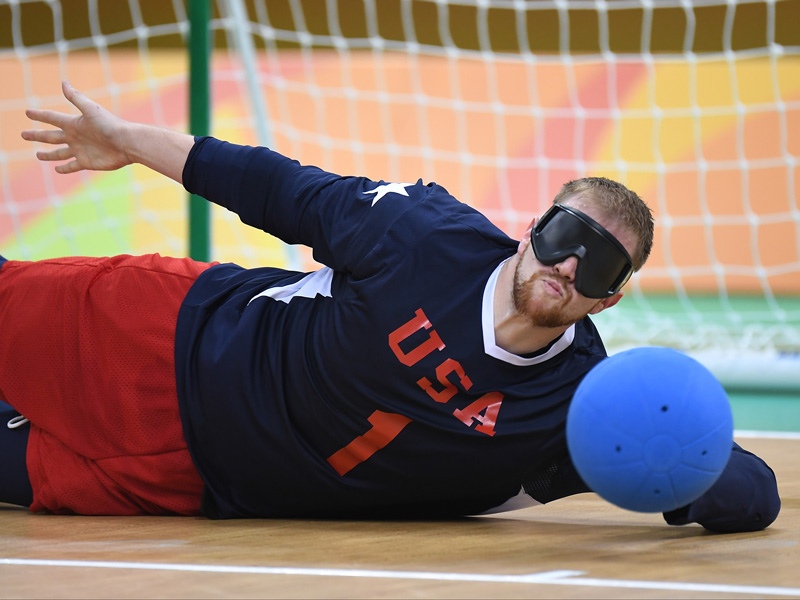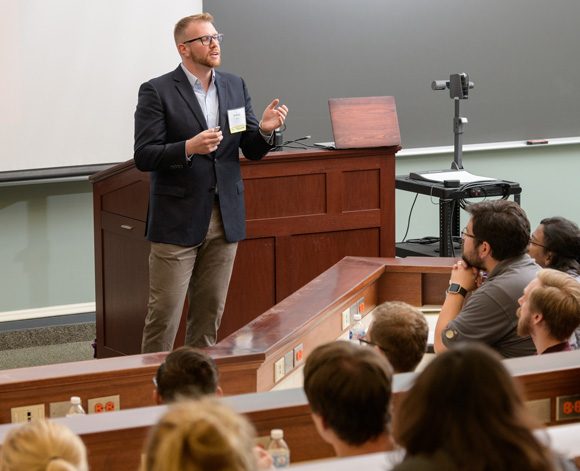


Academics, athletics, advocacy
Photos by Loren Worthington, courtesy of U.S. Association of Blind Athletes; and Evan Krape | Video by Ashley Barnas September 25, 2018
Doctoral candidate’s diverse work focuses on disability
Whether Andrew Jenks is writing his doctoral dissertation at the University of Delaware, competing internationally as an elite athlete, conducting research for the Social Security Administration or speaking to youngsters with disabilities, he has one key motivation.
He wants to improve social conditions for people with disabilities — people like himself.
His hope is to raise awareness of what those with disabilities are able to do and to help dispel the stereotypes that often limit their opportunities.
“I feel like there’s an aversion to talking about disability,” he said. “That’s one reason I started studying public policy related to disability. It’s a subject that resonates with me and with a community I’m engaged with.”
Jenks was born with a retinal condition known as incomplete achromatopsia, which is characterized by decreased vision, sensitivity to light and partial color blindness.
While still in elementary school, he attended a sports day at UD’s Bob Carpenter Center sponsored by the Delaware Association of Blind Athletes. As a 10-year-old at the time, he liked playing indoor soccer but couldn’t adapt to the larger field and bright sunlight in outdoor games.
The answer, he discovered at the sports day event, was goalball, a sport played exclusively by blind and visually impaired athletes, using an indoor court and a ball that the players track by the noise it makes. He was hooked and has played goalball ever since.
After graduating from Brandywine High School near Wilmington, Jenks earned a bachelor’s degree in political science at West Chester University.
Today, with a master’s degree from UD, he is a doctoral candidate in the Department of Political Science and International Relations. He is writing his dissertation, which examines and compares the formation of disability rights in the U.S. and Canada, while working as a teaching assistant in political science, women and gender studies and Africana studies classes at UD.

Despite the demands of school, he has made time to continue with athletics, not only competing but also speaking at events and working with youngsters in sports clinics.
Since making the U.S. national goalball team in 2010, when the men placed fourth in the Goalball World Championships, Jenks has competed around the world. With Team USA, he won a bronze medal in the 2014 International Blind Sports Federation’s World Goalball Championships and took silver in the 2016 Paralympic Games in Rio de Janeiro.
“It’s not easy to compete and also dedicate the time it takes to earn a Ph.D., but I’m trying to strike a balance,” he said. “Athletics gives me opportunities, and it gives me a platform to talk about disabilities, and that’s very important to me and to the community that I’m a part of.”
He also sees his stature as a successful athlete as a way to encourage and advocate for youngsters with disabilities.
“When you come in and do a camp or talk to kids about a sport like goalball, you create bonds and have fun,” Jenks said. “You don’t necessarily think about it as advocacy or activism, but it is … For blind and visually impaired kids, just getting out of the house for a group activity can be a big step.”
Children and teens with disabilities all need advocates, Jenks said, crediting his parents for filling that role for him as he grew up and learned to advocate for himself.
That need for support, even among adults, was brought home to him in a recent study he conducted for the Social Security Administration (SSA). In that research, Jenks surveyed 35 blind or visually impaired people, ages 21-64, across the U.S. who were receiving or had received some disability benefits from SSA, seeking a better understanding of their employment opportunities.
The result was a paper he wrote for the agency, titled “A Lack of Access,” that detailed many of the barriers to employment that the survey participants face.
“Blind and visually impaired people are very well educated compared to the general population, and to those with other disabilities, but they’re often unemployed or underemployed,” Jenks said. “There’s an overwhelming amount of stigma that still exists about their capabilities; every person I interviewed said they had had that experience with employers and potential employers.”
His report recommended some changes in SSA policy — the ways in which they communicate with blind and visually impaired recipients, for example — but especially emphasized the need for outreach to vocational rehabilitation specialists and to employers. By educating both groups on the capabilities of blind and visually impaired people, and providing training on up-to-date adaptive technology, most of those Jenks surveyed believed they could improve their employment situation.
The empirical study for SSA ties into the theoretical work he is doing for his doctoral dissertation. In both cases, he said, his hope is to change the perception of those with disabilities.
Jenks expects to complete his dissertation in 2019 and to work in academia, especially because he said he enjoys teaching as well as research. Political science hasn’t traditionally emphasized the study of disability policy, but like all social sciences, the field is becoming more interdisciplinary, Jenks said.
“I think the lines in social science are increasingly blurred,” he said. “We’re all fundamentally studying people and social problems and how to fix them.
“Academics need to remember why we’re doing this work. We want to make sure our scholarship has an impact on the real world.”
Learn more about goalball
For information about how goalball is played and for news about the sport, visit the U.S. Association of Blind Athletes website.
To see Jenks demonstrate his goalball throwing skills, view the video below or click this link to the video, recorded last year in a College of Health Sciences lab on UD’s Science, Technology and Advanced Research (STAR) Campus.
: youtube.com/watch?v=Jftv-F2S-Og
Contact Us
Have a UDaily story idea?
Contact us at ocm@udel.edu
Members of the press
Contact us at 302-831-NEWS or visit the Media Relations website

